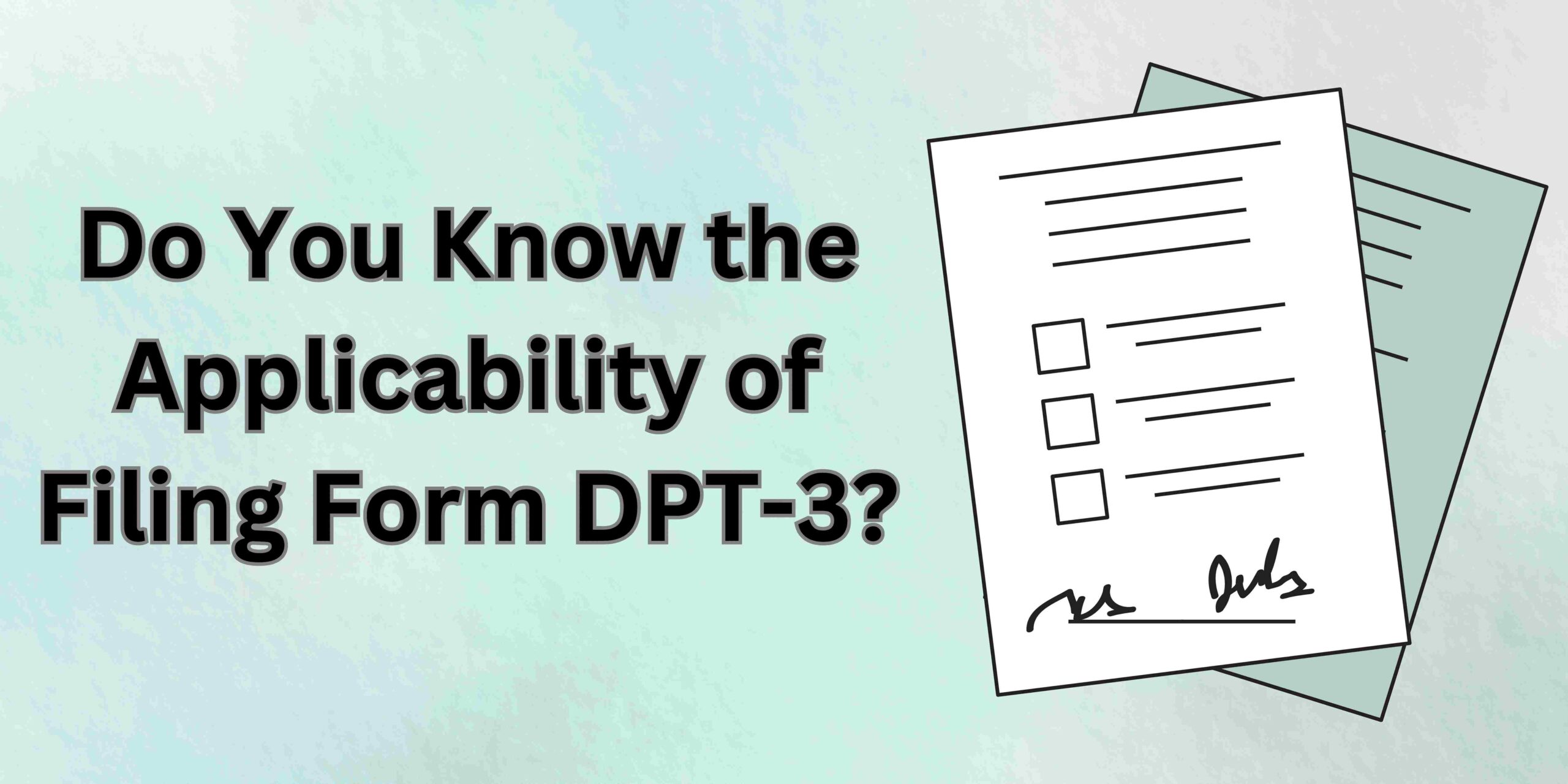Before going through the provisions of filing form DPT-3, we need to what is the exact meaning of deposits in the Companies Act, 2013. Section 73 to 76 and the Companies (Acceptance of Deposits) Rules, 2014 deal with the provisions related to the deposits and filing of Form DPT-3. Let us discuss the provisions related to acceptance of deposits by Companies and applicability to file Form DPT-3.
1. What is the meaning of Deposits?
Deposit means any receipt of money by a company in the form of deposit or loan or in any other form except the items mentioned in Rule 2(1)(c) of the Companies (Acceptance of Deposits) Rules, 2014.
2. Which companies can accept deposit from public?
- A public Company (hereinafter referred to as Eligible Company) having Net worth of minimum 100 crores or minimum turnover of Rs. 500 crores. Such company is also required to obtain credit rating. It should also obtain consent of its members by special resolution and filed such resolution with the ROC. However, the company may accept deposit by passing ordinary resolution if it is accepting deposit as per limits specified in section 180 (1) (c).
The maximum amount of deposit (excluding amount of deposit from members) should be 25 % of paid-up share capital, free reserves and securities premium.
- A government company subject to the condition that the total amount of deposits is 35% of paid-up share capital, free reserves and securities premium
3. Which companies can accept deposit from its members?
Any company other than eligible company which fulfills following conditions:
| S.No. | Particulars |
| A resolution is passed in General Meeting | |
| Issue a circular (in DPT-1) to its members showing its financial position and credit rating and amount due in respect of previous deposits |
- Eligible Company subject to the condition that total amount of deposits is not more than 10% of paid-up share capital, free reserves and securities premium
4. Which Companies are required to file form DPT-3?
The applicability to file Form DPT-3 is on the following Companies:
The Companies which have accepted deposit or which have entered into any transaction not considered not considered as deposits as per Rule 2(1)(c) of the above said Rules. However, Government Companies are exempted from the requirement of filing form DPT-3.
5. Which Companies are exempted from provisions of accepting deposits and filing form DPT-3?
- Banking Company
- Non-banking Financial Company (NBFC)
- Housing Finance Company (HFC)
- Any other company specified by Central Government
6. Due date to file form DPT-3
Form DPT-3 should be filed by 30th June every year with the particulars of as on 31st March of that year. The declaration by the auditor is required.
7. Purpose of Filing Form DPT-3
The applicability to file Form DPT-3 is required for submitting the particulars of:
- Deposits accepted by a company
- Any transactions entered into by a company not considered as deposits as per Rule 2(1)(c)
- For both the purposes as mentioned above
8. Terms & Conditions for acceptance of Deposits from members
- A company should not accept deposit which is repayable on demand
- A company should not accept deposit which is repayable on receipt of notice within a period of less than 6 months or more than 36 months. If a company wants to receive deposit repayable earlier than 6 months, then it may do so for meeting short term requirement of funds by complying with following conditions:
| S.No. | Particulars |
| The deposit should be less than 10% of paid-up share capital, free reserves and Securities Premium | |
| It should not be repayable before three months |
- Joint depositors should not be more than 3.
- The maximum limit for taking deposits is 35% of paid-up share capital, free reserves and securities premium. However, the private companies and Specified IFSC Public Company may accept deposit upto 100% of paid-up share capital, free reserves and securities premium
- Companies accepting deposits from public should create charge of the amount at least equal to amount of deposit within 30 days of accepting deposit
- Deposit 30% of the amount of deposit maturing every year in a scheduled Bank called as Deposit Repayment Reserve Account. This account should not be used for any other purpose.
- A certificate to be given that there is no default in repayment of deposit and if there was any default then it has been made good. The five years should have passed since the default was made good.
9. Punishment for default
- Default in complying with the conditions for acceptance of deposits or its repayment or failure to repay
Lower of:
Twice the amount of deposit; or
One crore rupees
- Officer in default
Imprisonment upto 7 years and fine minimum 25 lakh and maximum 2 crores
Liable under section 447 if it is proved that the officer in default has done contravention knowingly or with intention to deceive the company/shareholders/depositors/creditors/tax authorities.
Disclaimer:
The information provided in this content is for general informational purposes only. You should always seek the advice of expert before making any decisions based on the information provided. We do not warrant or guarantee the accuracy, completeness, or usefulness of the information provided. Any reliance you place on such information is strictly at your own risk. We shall not be liable for any damages, losses, or expenses arising out of or in connection with the use of this content.








